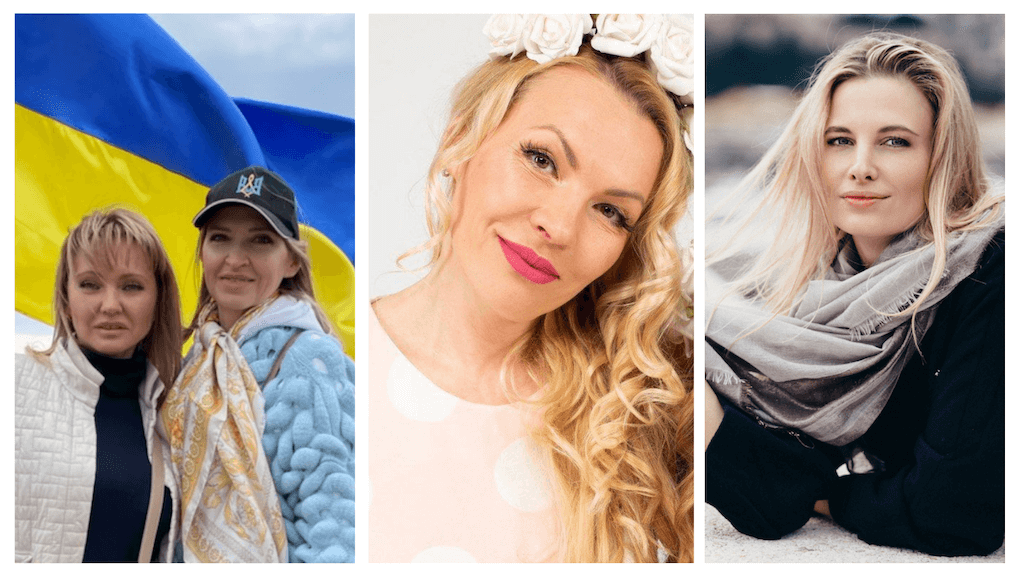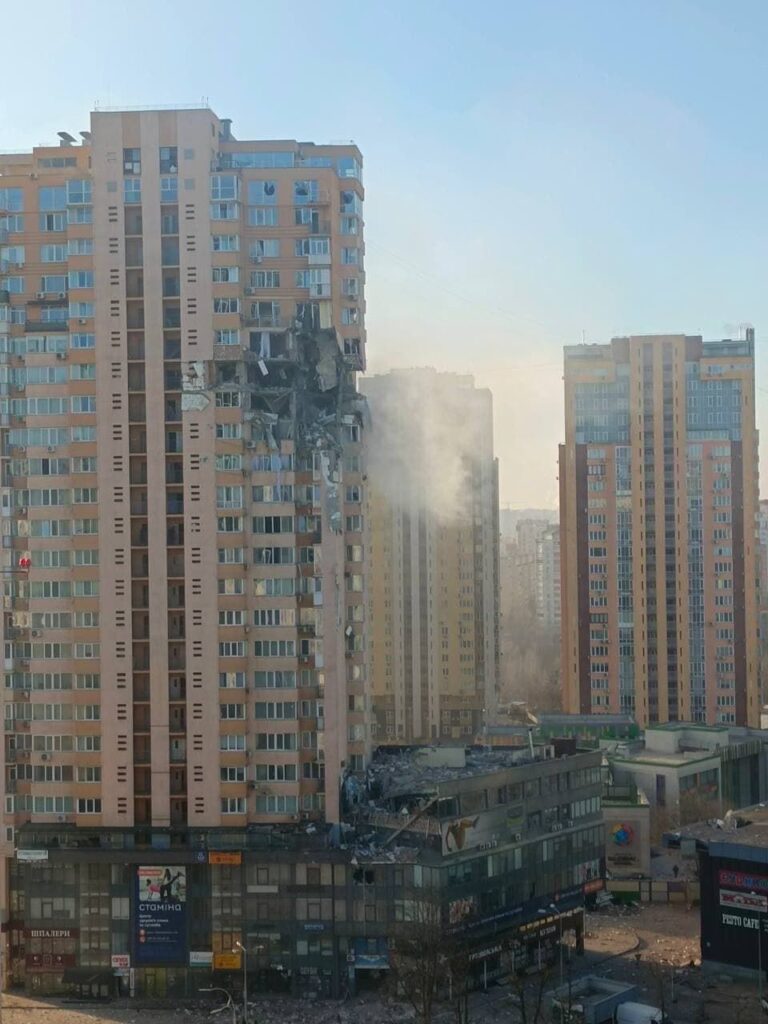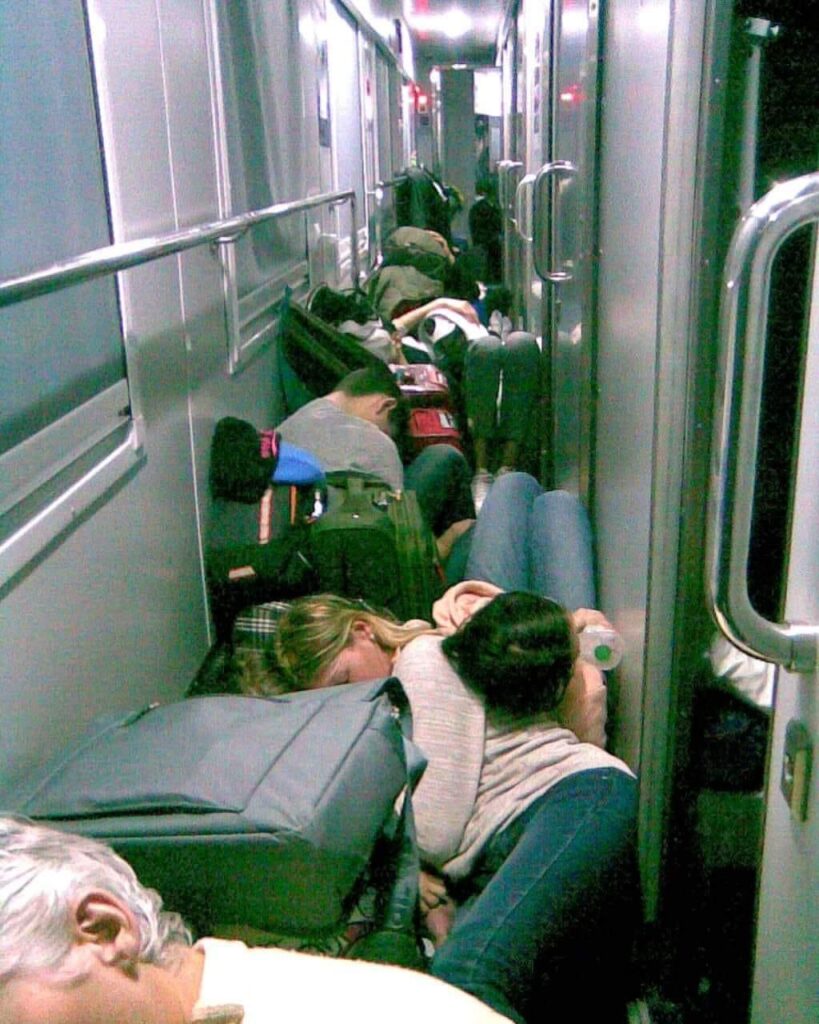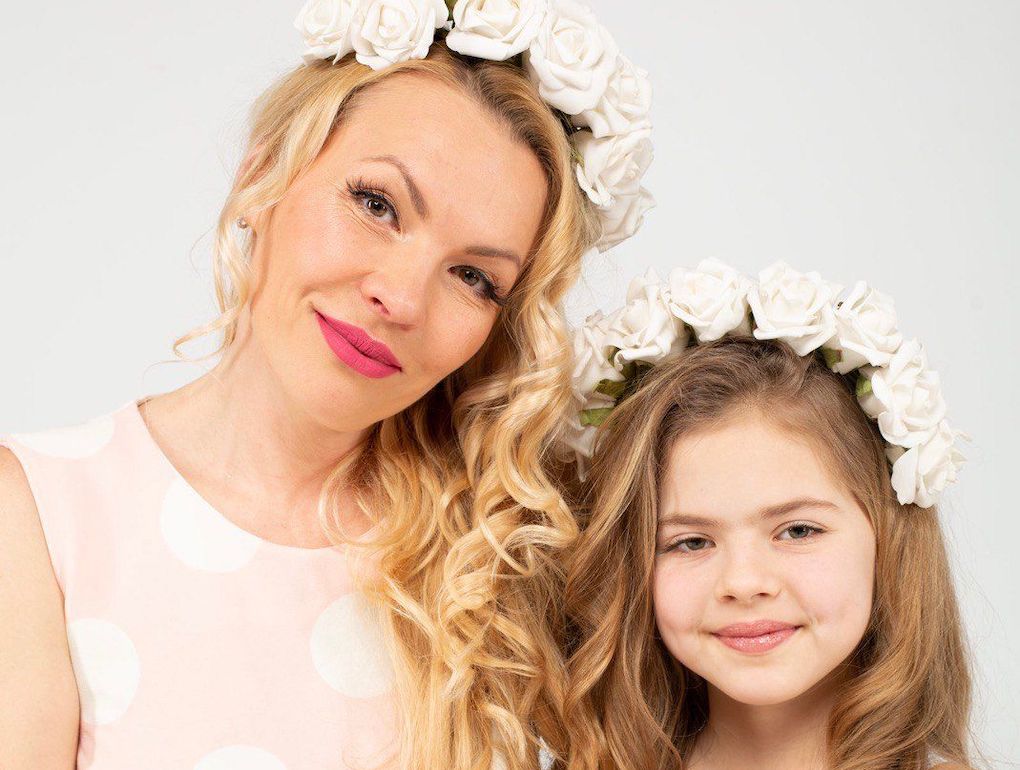Residents, refugees… Ukrainian women from Monaco tell their stories

Tetiana, Nataliya, Larissa and Zhanna have all experienced the war in different ways but share the same trauma.
Tetiana and Nataliya: fleeing the war at all costs
With a yellow and blue braided bracelet on her wrist, Tetiana serves coffee to Nataliya. They are old friends, originally from Kiev; Tetiana is a resident in Monaco, working in customer care for the Société des Bains de Mer. Nataliya works as a business developer in a company in Kiev. Watching the two women act and chat normally, it is hard to imagine that both have lived through a terrible experience, one they could ever have imagined: fleeing a war.

I felt like I was in a Spielberg movie
Tetiana
The first bombings
It all starts on February 17th. Even though it is whispered in Ukraine that Russia is getting dangerously close, no one believes that a conflict of this magnitude is imminent. The proof: Tetiana flies from the French Riviera to visit her parents, both of whom are sick with Covid-19.
“I went to look after them. Fortunately, their symptoms weren’t too serious,” says Tetiana. “My return flight was scheduled for the 24th.” But then: the armed conflict breaks out on February 24th. “My children live in Canada. Because of the time difference, they knew what was going on before I did. They called me up. It was six in the morning. They were very worried. Through the window, I could see people running with their luggage.”
Nataliya is awakened by the sirens echoing through the city at 5.45am. But doesn’t immediately panic: “The mayor of Kiev had warned us that there would be frequent drills. I didn’t understand what was going on right away. A few hours later, her employer sends her an email: everyone should stay at home.
The two young women are shocked to the core. Tetiana does not immediately realise that her return flight is in real jeopardy: “To my mind, it was unthinkable. I said to myself: ‘I’m going to the airport, my flight is scheduled for the 24th, that’s it, I’m going home!’ “Nataliya talks her out of it on the phone, and thankfully so: the airport is very quickly shelled by the Russian forces.

But they must act quickly. Nataliya immediately thinks of her mother, who is on medication. She goes out quickly to buy the medicine, as a precaution. There are only two pharmacies open, and the queues on the pavement stretch as far as the eye can see.
The same situation for Tetiana, who heads to a grocery store. The doors are still closed, but there is already a crowd. “At that point, you’re not thinking any more, you’re on autopilot. You don’t even know what to buy… I felt like I was in a Spielberg movie”, she says.
And very quickly, the city does start to look like something out of a war film. The two women hear the shelling in the distance and take pictures of passing Russian tanks and destroyed buildings. They must leave, and fast. But how? The airport is out, and fleeing by car is too dangerous, because of the fighting nearby and the risk of stray bullets. There is only one solution: the train.
We would jump when we heard the sirens, or people knocking hard on doors.
Nataliya
Destination: the unknown
Nataliya lives near the railway station: she can see it is packed with panicking Ukrainians. She talks to Tetiana about it. Although reluctant at first, she comes round to the idea. After spending a few days cooped up in their bathrooms, where they each set up their beds, they head for to the station on March 1st.
Tetiana shows us photos on her phone. The pictures look like something out of World War II: on the overcrowded platform, parents are lifting their children over their heads, trying to get them into the carriages first. Some are fighting, Tetiana is even hit in the face. Others have emptied their suitcases on the ground: heavy luggage is prohibited. “We were told, ‘it’s your suitcase or your child”.
Both eventually manage to get on the train. Nataliya has also brought her mother, her dog, and her cat. Tetiana, on the other hand, has had to leave her parents behind as they refused to leave.
It is only once they are on the train that the two women realise they have no idea where they are headed. They are not the only ones: they question the other passengers, shout out the question, ask the conductor. Nobody knows where the train is going. But at that point, the important thing is that they are leaving.
Passengers are squeezed in on top of each other, even sleeping in the corridors. After a 24- hour journey, they finally arrive at their destination: Budapest, Hungary. Tetiana’s husband, who was sick with worry, books them a hotel room and a flight to Paris. The horror is behind them, but the fear remains.
“We would jump when we heard the sirens, or people knocking hard on doors. My mother kept the shutters closed, ” Nataliya recalls. But once in Paris, another challenge presents itself: while Tetiana is a Monaco resident, Nataliya is now a refugee, with no family or accommodation in France.

My whole life is in a carry-on suitcase
Nataliya
Rebuilding
Tetiana’s apartment is too small to take in two more people and two pets but leaving her friend to fend for herself is out of the question. She uses all the means she has – social networks, friends, colleagues… And a colleague at the SBM, who owns an empty property in Nice, agrees to put Nataliya and her mother up.
“I was really touched to see how much France and Monaco were supporting Ukraine,” says Nataliya, with emotion in her voice. “Many people were prepared to take us in. I got several messages from strangers who agreed to put us up. A mother even offered to have her daughter sleep with her so she could lend us her room.”
Since then, the two women, are trying to get on with their lives despite still being traumatised. Nataliya must start from scratch: “My whole life is in a carry-on suitcase right now. I don’t even know if my apartment in Kiev is still here or if it was bombed out. I signed up at Pôle Emploi (the job centre), I must try to find a new job… life goes on.”
Tetiana’s days are governed by her phone. “I check my messages the minute I wake up. My parents are still there, they can’t even go down to the shelter in the event of a bombing raid. I had a hard time, but I managed to find someone there to take care of them and make them food. I call them every day.”
A nightmare scenario, accompanied by a terrible feeling of guilt: “How are we supposed to enjoy life when we know that our loved ones are suffering? We did everything we could to get out of Ukraine, but now we feel like we shouldn’t be here, acting as if nothing has happened, going to the restaurant, or having a drink…”
Now it’s time to rebuild, with one goal: to try to live as normally as possible.
Larissa: leaving her life behind

Fleeing the war, for a second time. Larissa, a Ukrainian refugee now based in Nice, recalls the day when her life changed. It is Tuesday, March 8th, and Larissa is getting on a bus out of Kiev, along with her 10-year-old daughter. Her husband and her 22-year-old son have to stay behind to defend their country.
“I didn’t want to leave,” she explains. “We already had to flee from Sievierodonetsk to Kiev in 2014 because of the fighting and bombing. We stayed there for eight years and found ourselves being bombed again, even though we had moved there to find a safe place… After this terrible experience, my husband and son convinced me to take our daughter and cross the border.”
An old friend, who left Ukraine during the events of 2014, makes the arrangements. Larissa and her little girl can take a bus from Kiev to Nice, where she now lives. It is the start of an arduous journey over two and a half days, as women and children flee the country.
When the bombing started, we had an hour and a half to pack.
Learning to live together
Larissa and her daughter stay with the Ukrainian friend for a while, before being put up by a foster family from Nice. For more than a week now, they have been sharing the daily lives of a couple, their two children and their dog. A cohabitation that, for the moment, is working out very well: “I was really surprised by the warm welcome in France. When you arrive in a new country, you don’t know anything, you can’t do anything, but at every turn there is someone to help you. (…) It means so much to see the solidarity of people here, who feel concerned about your situation, as if it were their own. Many people have helped us, especially with the administrative side, or with the language barrier.”
With no French and very little English, she manages to communicate with her host family thanks to the mother of the family, who is of Polish origin and fluent in Russian. Larissa and her daughter have their own bedroom and privacy in the new house. Otherwise, family life is straightforward. “In the morning, everyone goes about their business. In the evening, we all get together for dinner. They are very kind; they show a lot of compassion towards us.”
SEE ALSO: Prince Albert II wishes to welcome Ukrainian refugees to the Principality
But despite the warm welcome, Larissa keeps thinking about what she has left behind. She fills up as she recalls the moment when she had to go: “when the bombing started, we had an hour and a half to pack our bags (…) It’s a very nice house, and a very nice room, but I miss my home, driving my own car, wearing my own clothes… “, Larissa explains, adding that they will have to leave in May, as the family has relatives coming to stay then.
My daughter asked me, “Mummy, what did we do wrong to make them want to kill us?”
Keeping in touch
Meanwhile, for Larissa, the hardest thing is the conversations with her daughter. Little Violanta was only three years old at the time of their first move, and did not really realise what was going on, but she is now ten. “On the first day, she didn’t say anything. She just looked me in the eye, she had the same emotions as me, but she didn’t ask a single question. Then one day she asked me, “Mummy, what did we do wrong to make them want to kill us?” It’s hard enough to explain to an adult, but even harder with a child.”
More than anything, Larissa hopes to be able to protect her daughter: “most of the information we get comes from our friends or loved ones who are still there, not the news (…) My only goal today is to protect my daughter from hatred.”
The little girl has just started school in Nice. She was a little nervous at first but has been warmly welcomed. “I’m sure everything will be fine, other Ukrainian children have enrolled there too. The others will speak the language of the heart.”
Larissa is trying her best to keep in touch with the loved ones who remained in Ukraine. Her husband and son, of course, but also her mother, who refused to flee her home village until the last moment. “She was tired of running,” she says, regretfully. “But when there was no more water, food, or electricity, she ended up leaving and now lives in western Ukraine. You know, it’s like Russian roulette: any house, any city could be attacked during the night.”
Although she now feels safe, the anxiety does not go away, nor the feeling of guilt. “I hope to go home one day, I love my country, I want to go back… To be with my family, lead an ordinary life, get up and go to work in the morning… We don’t appreciate enough how precious that kind of life is. (…) There’s no justification for killing people, children shouldn’t suffer like this.”
Today Larissa is hoping for a miracle and dreams of the day when peace will finally be declared.
Zhanna: dealing with the conflict from a distance
Zhanna Pikhulya has been living and working in a real estate agency in Monaco for ten years. For ten years she only returned to her native Ukraine to see her father, who lives in a small town 300 kilometres east of Kiev. But everything changed overnight.

“It was a terrible morning,” she says. On February 24th, I woke up and looked out the window at the sea as usual. I noticed it was a strange colour that day. It wasn’t blue, it was grey. Like there was something wrong. And when I looked at my phone, I saw I had 60 messages and missed calls. I immediately realised that something terrible was going on. My Dad had called me at three in the morning, and so had my sister, who lives in Los Angeles, with the time difference. It was horrible, just horrible. I didn’t put my phone down all day.”
Those who have fled have seen some absolutely terrifying things
The shock of the news
Like her compatriots, it was a hammer blow for Zhanna: “I thought we had learned something after the Second World War. I didn’t think I’d ever experience a war. I didn’t believe it, right up to the last minute, even though there had been some speculation, especially in the media. I thought they were exaggerating. It was thought that there would just be a small conflict in the east, but never in Kiev or in the rest of Ukraine. It is a huge shock.”
At the time, the only thing that mattered was getting her father home. But fleeing Ukraine is getting harder with each passing day. “It is extremely dangerous: the Russian army is shooting at civilian cars. It’s like Russian roulette, it’s a massive risk,” Zhanna explains. Since the beginning of the war, she has been hearing the stories of those who fled to the border, risking their lives. “You can’t describe a war if you haven’t lived through it… Those who have fled have seen some absolutely terrifying things.”
I think this is a unique opportunity for Ukraine to get out from under Russian influence
Helping despite the distance
Fortunately, Zhanna’s father and his dog managed to reach the border and get to Monaco within a few weeks, where they now live: “I am really happy and relieved. You must understand that people who are fleeing Ukraine today are being forced to do so for their survival. People are being forced to leave their homes, their loved ones, their jobs… That’s why many of them want to go back, if only to see if their house is still there.”
Today, Zhanna is trying to help as best she can. She helped at the food drives at the Marriott Hotel in Cap d ‘Ail. And she was very moved by the Principality’s involvement in supporting the Ukrainian cause: “It was wonderful to see all these aid programmes, like the collection in front of the Fontvieille Carrefour, for example.”
SEE ALSO: Support Ukraine on your next cultural outing
But above all, she is looking to the future, to the day when, the war will be over at last, and the country will have to be rebuilt. Apart from the war itself, she feels it could be a good thing: “I think this is a unique opportunity for Ukraine to get out from under Russian influence. When the USSR collapsed, I think Ukraine didn’t stand a chance. The country found itself under control. I think that when the war is over, everything will be better for Ukraine, at least I hope so.”









